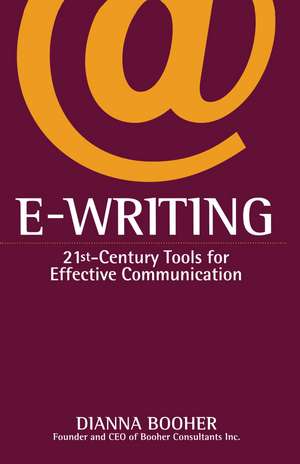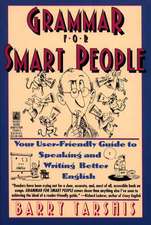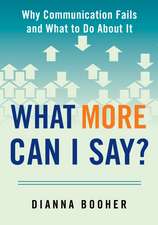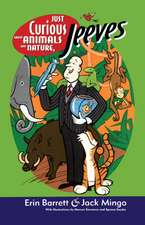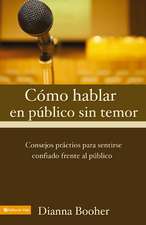E-Writing: 21st-Century Tools for Effective Communication
Autor Dianna Booheren Limba Engleză Paperback – 20 aug 2001
Preț: 149.31 lei
Nou
Puncte Express: 224
Preț estimativ în valută:
28.57€ • 29.72$ • 23.59£
28.57€ • 29.72$ • 23.59£
Carte disponibilă
Livrare economică 24 martie-07 aprilie
Preluare comenzi: 021 569.72.76
Specificații
ISBN-13: 9780743412582
ISBN-10: 0743412583
Pagini: 400
Dimensiuni: 140 x 216 x 25 mm
Greutate: 0.5 kg
Ediția:Original
Editura: Gallery Books
Colecția Gallery Books
ISBN-10: 0743412583
Pagini: 400
Dimensiuni: 140 x 216 x 25 mm
Greutate: 0.5 kg
Ediția:Original
Editura: Gallery Books
Colecția Gallery Books
Notă biografică
Dianna Booher is author of over thirty-five books, many of which deal with various aspects of communication. As the founder and CEO of her own training firm, Booher Consultants Inc., Dianna is a respected expert in her field. She works with twenty-five of the fifty largest corporations in America and 227 of the Fortune 500.
Extras
Chapter One: Select the Right Medium to Communicate
We began the last millennium in unity and ended it in isolation. At the turn of the twentieth century, people gathered in town halls to talk politics, went to the theater to watch silent movies, heard news from the same few radio broadcasts, bought gifts and tools at the general store, read about new trends from the same monthly magazines, and studied all subjects in the same classroom.
At the dawn of the twenty-first century, we talk politics in virtual chat rooms, select our movies for home viewing from any of 500 television stations or the corner video-rental shop, buy our gifts and tools from the paper or online catalog, hear our news on television while in the bathroom, read about new trends while in Latvia with our laptop connection to the Internet, and study our online courses at home alone at midnight.
In such a world of emotional disconnection, there's a growing sense of discontent. Customers and coworkers long to be treated as special, important individuals. An automated tracking system that responds to our log-on with "Hi, Bob. Welcome back. The last time you visited, you ordered X" does not exactly leave us with a warm, fuzzy feeling. It has been a long time since having our name inserted in the middle of a direct-marketing letter impressed us.
In an age of impersonal "customization," customers and clients want personal communication. They want a live person to send them an individual e-mail with an answer to their specific question or a suggestion for their specific problem. To confirm the phenomenon, you have only to take a look at your mailbox to see how many chain letters, jokes, and inspirational stories and poems get forwarded to you by friends, coworkers, and customers. These are attempts to say "Let's connect. Let's share a laugh or a tear. Is anybody out there? Do you remember me?"
The e-mail, letter, or proposal writers who can make a positive emotional connection with their writing will win coworkers' and customers' attention, business, goodwill, and loyalty.
Know When to Send an E-Mail, Fax, or Formal Letter or Report
Impact, reference, speed, and distribution are the key criteria. Let's take them one at a time:
Impact: It's an image decision: tux or blue jeans. Protocol may demand a formal report or letter. When introducing yourself, your product, or your service to a new organization or to a new individual within the organization, most people still expect a formal letter, proposal, or other literature to arrive in hard copy, to be read at their leisure. In other words, if you're writing to the CEO, he or she will generally consider an e-mail a breach of etiquette as a first-time communication from an outsider.
Protocol aside, consider the look. Prefer to prepare a formal report or letter if the content requires editing and formatting capabilities not available on your e-mail software or that of the reader's.
Finally, consider the formality or informality: Because e-mail is commonly used for routine day-to-day business, the recipient doesn't attach as much importance to an e-mail message as to a formal report, letter, or proposal.
Reference: Will the recipient need to find your information three years from now? With most software programs, you can easily delete all e-mail older than a preset date with a few keystrokes -- or routinely during the archiving process. Although e-mails can be kept indefinitely, most users don't bother to make an exception with their file command on a document-by-document basis.
Speed: Yes, you can send a report across town or cross-country by courier in a few hours. But e-mail takes mere seconds. (Of course, when the e-mail may get read is an altogether different matter.)
Distribution: Yes, you can make 50 copies of a 20-page report and distribute it around the building or fax it cross-country. But that's definitely more expensive and more trouble than hitting a few keys. Second, consider the ease of a recipient forwarding your information to others. That's easier done (with you controlling the quality of the "reprint") by e-mail.
Impact, reference, speed, distribution. Consider each in making your decision about which medium to use e-mail for a specific message.
Know When to Phone Instead of Writing E-Mail or Letters
Prefer to phone when:
Prefer e-mail to the phone when:
Nothing makes another person as angry about the wrong choice of media as the following situations: 1) when someone leaves a voice mail with detailed information that needs to be transcribed almost in its entirety; or 2) when someone e-mails about a situation that has too many discussion points, requiring either an ongoing saga or an extended, time-consuming response.
Understand the Dangers of E-Mail Misunderstandings and Major Faux Pas
For all its convenience, e-mail has a few drawbacks. Consider them carefully. First, humor doesn't travel well in typical e-mails -- unless authored by skilled comedy writers. In the absence of tone of voice, facial expression, and body language, readers may interpret your flippant or witty remark as literal and stupid.
Second, you risk losing control of what you've written. Yes, others should not forward your sensitive messages without your permission. But they often do. Forwarding other people's e-mail tempts people of even the highest integrity.
Two good questions to ask yourself before putting anything in e-mail: 1) What might happen if this e-mail were forwarded to everyone in the company? 2) What might happen if a client or supplier sued us, and all our e-mail records were subpoenaed for court?
Commit your information and opinions to e-mail accordingly.
Copyright © 2000 by Dianna Booher
We began the last millennium in unity and ended it in isolation. At the turn of the twentieth century, people gathered in town halls to talk politics, went to the theater to watch silent movies, heard news from the same few radio broadcasts, bought gifts and tools at the general store, read about new trends from the same monthly magazines, and studied all subjects in the same classroom.
At the dawn of the twenty-first century, we talk politics in virtual chat rooms, select our movies for home viewing from any of 500 television stations or the corner video-rental shop, buy our gifts and tools from the paper or online catalog, hear our news on television while in the bathroom, read about new trends while in Latvia with our laptop connection to the Internet, and study our online courses at home alone at midnight.
In such a world of emotional disconnection, there's a growing sense of discontent. Customers and coworkers long to be treated as special, important individuals. An automated tracking system that responds to our log-on with "Hi, Bob. Welcome back. The last time you visited, you ordered X" does not exactly leave us with a warm, fuzzy feeling. It has been a long time since having our name inserted in the middle of a direct-marketing letter impressed us.
In an age of impersonal "customization," customers and clients want personal communication. They want a live person to send them an individual e-mail with an answer to their specific question or a suggestion for their specific problem. To confirm the phenomenon, you have only to take a look at your mailbox to see how many chain letters, jokes, and inspirational stories and poems get forwarded to you by friends, coworkers, and customers. These are attempts to say "Let's connect. Let's share a laugh or a tear. Is anybody out there? Do you remember me?"
The e-mail, letter, or proposal writers who can make a positive emotional connection with their writing will win coworkers' and customers' attention, business, goodwill, and loyalty.
Know When to Send an E-Mail, Fax, or Formal Letter or Report
Impact, reference, speed, and distribution are the key criteria. Let's take them one at a time:
Impact: It's an image decision: tux or blue jeans. Protocol may demand a formal report or letter. When introducing yourself, your product, or your service to a new organization or to a new individual within the organization, most people still expect a formal letter, proposal, or other literature to arrive in hard copy, to be read at their leisure. In other words, if you're writing to the CEO, he or she will generally consider an e-mail a breach of etiquette as a first-time communication from an outsider.
Protocol aside, consider the look. Prefer to prepare a formal report or letter if the content requires editing and formatting capabilities not available on your e-mail software or that of the reader's.
Finally, consider the formality or informality: Because e-mail is commonly used for routine day-to-day business, the recipient doesn't attach as much importance to an e-mail message as to a formal report, letter, or proposal.
Reference: Will the recipient need to find your information three years from now? With most software programs, you can easily delete all e-mail older than a preset date with a few keystrokes -- or routinely during the archiving process. Although e-mails can be kept indefinitely, most users don't bother to make an exception with their file command on a document-by-document basis.
Speed: Yes, you can send a report across town or cross-country by courier in a few hours. But e-mail takes mere seconds. (Of course, when the e-mail may get read is an altogether different matter.)
Distribution: Yes, you can make 50 copies of a 20-page report and distribute it around the building or fax it cross-country. But that's definitely more expensive and more trouble than hitting a few keys. Second, consider the ease of a recipient forwarding your information to others. That's easier done (with you controlling the quality of the "reprint") by e-mail.
Impact, reference, speed, distribution. Consider each in making your decision about which medium to use e-mail for a specific message.
Know When to Phone Instead of Writing E-Mail or Letters
Prefer to phone when:
- You need an immediate response. (You can't guarantee when someone will answer e-mail, but if you catch him or her answering the phone, you may get an immediate response.)
- You want to hear someone's voice tone to "read between the lines" about the message, information, personal commitment, and so forth. People are typically less on guard when speaking than when writing.
- You need to ask questions and negotiate issues, and the answers to the questions determine your immediate direction in the negotiations.
- You are concerned about the privacy of your comments.
Prefer e-mail to the phone when:
- The information is complex and will warrant repeating (rereading).
- A written copy will be more convenient for later reference.
Nothing makes another person as angry about the wrong choice of media as the following situations: 1) when someone leaves a voice mail with detailed information that needs to be transcribed almost in its entirety; or 2) when someone e-mails about a situation that has too many discussion points, requiring either an ongoing saga or an extended, time-consuming response.
Understand the Dangers of E-Mail Misunderstandings and Major Faux Pas
For all its convenience, e-mail has a few drawbacks. Consider them carefully. First, humor doesn't travel well in typical e-mails -- unless authored by skilled comedy writers. In the absence of tone of voice, facial expression, and body language, readers may interpret your flippant or witty remark as literal and stupid.
Second, you risk losing control of what you've written. Yes, others should not forward your sensitive messages without your permission. But they often do. Forwarding other people's e-mail tempts people of even the highest integrity.
Two good questions to ask yourself before putting anything in e-mail: 1) What might happen if this e-mail were forwarded to everyone in the company? 2) What might happen if a client or supplier sued us, and all our e-mail records were subpoenaed for court?
Commit your information and opinions to e-mail accordingly.
Copyright © 2000 by Dianna Booher
Recenzii
Working Woman Dianna Booher incorporat[es] commonsense advice on office politics and tact.
Descriere
The first book to combine timely guidance on effective e-mail and to-the-point voice-mail with all the classic, simple advice on writing we've come to expect from the bestselling author of GOOD GRIEF, GOOD GRAMMAR.
